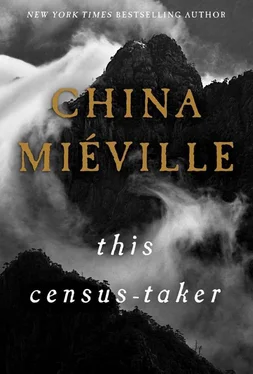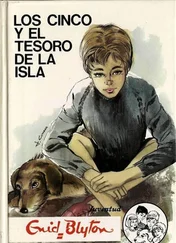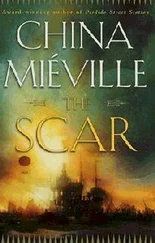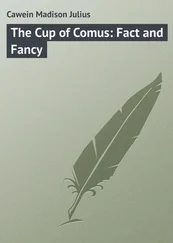My mother opened the gate one time and I watched in alarm as she bent to pick up a stained metal bolt. From there I followed her to where, in tangled alleys closer to the gulch, it was the architecture and not the plants that accommodated; buildings angled to allow for vegetation that had predated them, that then sometimes died to leave tree-shaped emptinesses in the town walls. I’d run into those nooks to stand cosseted by the bricks while my mother waited.
Little banyans lined one loud market street too steep for carts, smoky from workshops. The branches dropped shaggy creepers that, when they reached the earth, hardened into roots and pried apart paving. Locals would watch us uphillers from shacks tucked under the boughs, selling cigarettes and candies. Where they met the roofs, the dangling sinews hardened around their contours, so when those shops ultimately failed and rotted the trees themselves became open-fronted root boxes into which a boy could also step, to stand under ceilings of tangle, creeping down as if tentative and disbelieving that there was at last no metal to impede them. If you were slow enough, I thought, they’d turn to pillars and anchor you within.
Those bridge children would follow me.
I tried not to look too often but I could always see a girl and a boy at the front of the crew, roughhousing and raucous and seemingly fearless in their cutoff adults’ clothes. I wasn’t precisely afraid of them; I watched them with intense and guarded fascination, finding them inexplicable.
I had no money and my face was not winning enough that I was ever given anything free by candy-sellers. My mother stared as if overwhelmed at everything in the huts we passed, all the bright packets dangling within, with an expression that made me want desperately to be older for her.
A haggard man used one of the huts as a home. He lay on a sagging mattress, his head on his pack, surrounded by rubbish — paper, porcelain shards, food remains, and unidentifiable debris. His hand was over his eyes. He looked like a failed soldier. Dirt seemed so worked into him that the lines of his face were like writing.
Beside him was a green gallon bottle, and something twitched within. I saw leaves in it, a moth’s beating wings. A handwritten sign pleading for money was propped against the glass, a fee for looking. I lurched back as a saggy gray lizard bigger than my hand ran suddenly in crazed circles at the bottle’s bottom.
Claws skittered against the glass like teeth lightly grinding. The bottle’s neck was coin-sized: not even the reptile’s head could have fitted through.
I ran to catch my mother. When I reached her I looked into her bag: she’d exchanged the food she’d brought down for other food, and rattling beneath those vegetables were more bits of trash like the one she’d taken from the metal yard.
There was a catcall. My mother and I looked up to where that leading boy from the bridge was in the scaffolding that held up a ruin. His companions waited under him. He let go of the girder he’d been holding, stayed balanced easily on another, shifted twitchily from foot to foot and watched me. He was short for what I think was his age, not much taller than me, but squat and strong and confident with his body. He called out again but my mother and I didn’t know what to do, what response to give.
My mother looked at the children and back at me. “Do you want to play?” she asked me.
I knew she wanted me to help her understand. Did I want to play?
She said, “Play with them.”
She said she’d come to find me when the sun went low, and she walked away. Horrified, I cried out and tried to go with her, but she pushed me back toward the children and repeated her instruction.
I watched her go. The children approached: they’d seen her point at them.
That first time, what happened was that they continued their own games, always in shouting distance from me, a distance they made sure didn’t grow too great. They performed their games for me. Once, when I grew distressed and made as if to go looking for my mother, the tall solid girl, the boy’s co-leader, shouted at me directly, a warning sound that stopped me.
We were each other’s spectators and performers. I got caught up in the gang’s quick dramas, so thoroughly that when at last I saw my mother at the street’s end below spitting streetlights, I realized she’d been waiting in the shadows for a while. She was standing with her eyes closed, listening to the bulbs’ buzz, leaving it to me to see her.
I was crying at that moment, at some brutal turn of the children’s game, and they were muttering to me with solicitous scorn.
When they shouted at me they called me uphiller. I didn’t call them anything.
—
The girl was Samma, the boy Drobe. It was they who told all the adultless others what to do.
I learned their names quickly because during the gang’s jaunts their companions would sometimes shout “Samma!” or “Drobe!” then cackle and hoot as if those names were curse words, as if they were bad and brave for yelling them.
My mother never spoke to the children. But by the cold kindness she could manage, when she left me for her business, she did so where I could see them and they me.
I’d rarely say more than a few whispered words to them while they bossed each other or wrestled or stole things. Even when they told me what to do directly, or when I obeyed.
“Chuck that bottle at that poster! Go on, uphiller! That was good! Right in the letter A!”
I adored them shyly.
Samma must have been fourteen or thereabouts, around twice my age, and Drobe only a little younger. They might have been friends or girlfriend and boyfriend, though I never saw them kissing, or sister and brother. She stood close to a head taller than Drobe, and she was fleshy and deliberate in her movements where he was nervy and quick, but their faces were similarly dark and angular and heavy browed, as if they had been cut hurriedly from wood. They both kept their black hair shaved close.
I followed them on their runs and provocations — a little theft and the breaking of windows, was all. Locals would toss coins at them sometimes to have them do errands and they’d examine the money before picking it up, assessing the worth and debating whether to accept it for the haulage or cleaning demanded.
As the day closed they would take me back to where I’d joined them. Samma would click her fingers for me to follow and walk me to where my mother stood looking at the men and women passing her by.
Once on our way we crossed the end of the banyan street, and Drobe saw me stare up it. However he knew my thoughts, he said to me, “We ain’t going that way.”
He was wearing a tall flat-topped hat that day, buckled from the trash where he must have found it. He often wore such a thing, or a bright bandana, or the remains of some studded belt, as if auditioning each item. I never saw any of them more than once.
“Drobe!” a boy hallooed behind us.
“How did he put the lizard in the bottle?” I whispered.
“That lizard?” Drobe sort of coughed a laugh and glanced away. “Magic, mate. Come on, you don’t want that shit,” he said, and he and Samma led me to a roofless storehouse where we could throw things around.
—
Sometimes her activities took my mother long enough that we were still in the bridgetown when the sun descended and all the nightlights came up.
If we were by the bridge at dusk, I liked to watch the children batting.
They’d sit up close to the railings with their legs pushed through, dangling them over the treetops of the gulley. A few brave ones would balance on top of the metal, right above the void. Though she looked too big to be safe, seemed almost too adult to risk herself in that manner, Samma always sat like that. My gut would swoop to see her. I could only glance, it made me so sick.
Читать дальше












